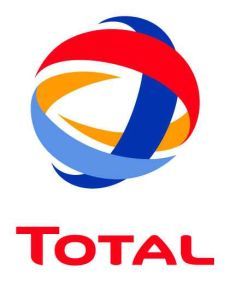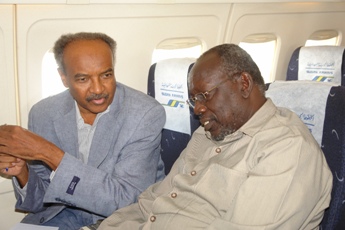Total to resume soon oil exploration in Sudan’s Jonglei – minister
By Alsir Sidahmed
July 7, 2010 (KHARTOUM) — The French oil company Total SA (TOT) is expected to announce any time this month its plans as far as work resumption in block (B) in Southern Sudan State of Jonglei.
 “I’ve asked them to sit with our staff in the (petroleum) ministry and put a resumption of work date sometime after the joint session,” Dr. Lual Deng, the federal minister of oil told Sudan Tribune and the independent Arabic daily Al-Akbar in a wide ranging interview conducted in a plane on the way to Thar Jath oil field last week.
“I’ve asked them to sit with our staff in the (petroleum) ministry and put a resumption of work date sometime after the joint session,” Dr. Lual Deng, the federal minister of oil told Sudan Tribune and the independent Arabic daily Al-Akbar in a wide ranging interview conducted in a plane on the way to Thar Jath oil field last week.
He said that such a decision is expected to be announced this month after the joint session. “Total wants assurances from the SPLM that they’ll continue work (in the future even if the South secedes) and I gave them those assurances,” he further added.
Total entered Sudan in 1980 when it formed a consortium with Texas-based Marathon Inc. and the Kuwait Petroleum Co. to explore a 110,000 square kilometers block about 5% of Sudan’s area. Total began seismic tests in 1983, only to see its operation engulfed by an outbreak of Sudan’s long-simmering war. The French giant oil company pulled out in 1984 after one of its subcontractors was gunned down. During the next 20 years the consortium held onto its lease, citing the war as the reason it couldn’t move ahead.
In 2004 and as concluding the Comprehensive Peace Agreement seemed imminent it renewed its right to the concession, but by that time, the SPLM had brought in the tiny U.K. upstart, White Nile Co. (WNL.LN) to work in the same block (B) and a legal battle ensued. In July 2007 the National Petroleum Commission (NPC) confirmed that Total has the right to operate, but the company did little or no activity over the past two years since the NPC decision was enacted.

Asking Total to resume work is one of the steps the new minister is taking to help push production figures up. Output has been hovering around 485,000 barrels per day (bpd) for more than three years.
He attributed that to a number of reasons. On the top comes security concerns at the local level, where communities ask for compensations, services etc to the extent that these moves lead to either shelving some expansion plans or worse production stoppage. One of the first visits to make was to Heglig to have first hand impression, hold meetings with officials that were attended by the governors of the two neighboring states of Southern Kordofan Ahmed Haroun and that of Unity states Taban Deng.
In these meetings it was agreed that security officers of the two states meet monthly to evaluate the situation and keep on improving it, to adopt the approach of communal compensation instead of individual one. Part of the deal Unity state dropped its opposition to some expansion plans that are going to add a new 5,000 bpd in blocks 1, 2, and 4, which is not much, but will help the state which is getting 2 percent out of what it produces.
The minister also revealed that the consortium of White Nile Petroleum Operating Company (WNPOC) led by the Malaysian Petronas has notified the ministry that it is relinquishing its rights in Block 5-B, which has shown poor results following drilling a number of wells that came out dry. Moreover, the minister said that he has given Moldovan company Ascom a 30-day warning up to the end of this month either to regulate its presence of leave the concession.
The second factor affecting production levels has to do with the low quality of some crudes like Dar produced out of blocks (3&7), which has been finding difficulty to attract refiners given the fact that its main market is US and Japan and the American sanctions are affecting its marketing, though China has been taking increasing amounts of this low quality, acidic crude of late.
The quality problem is affecting also crude produced out of block 5-A and is keeping a cap on plans to increase its volume from 17,000 bpd pumped currently. Crude is shipped via a 176km, 24 inch spur to tie with the pipeline carrying Nile Blend, which is Sudan’s top selling crude. Increased amounts from Thar Jath are bound to affect the quality of the Nile Blend. One of the ideas being floated is to set up a small refinery that can meet the domestic needs of the Unity state and help pump more oil of Thar Jath, which is estimated to have close to 200 million barrels reserve and double its current production easily.
Also part of the technical problems that need to be addressed is the growing percentage of water cuts in blocks 1, 2 and 4 run by Greater Nile Petroleum Operating Co. reaching up 80 percent in some cases.
Asked about the idea of an alternative pipeline to carry oil from the South through Kenya, Dr. Deng described it as, “uneconomical and expensive.” Moreover, in a peaceful situation, the South sill continues to use existing downstream facilities in the North, “but if you are forced economy does not make sense”.
Japan’s Toyota Co. has been floating an idea to build an alternative pipeline at an estimated cost of $1.5 billion, though other experts argue that such pipeline needs several years and multi billions of dollars to construct and in the end does not make economic sense as it competes with an existing pipeline.
He is more hopeful that oil could play a positive role as its revenues could be used especially in the border areas between the North and South to build interest for peace and reduce chances for the outbreak of violence.
(ST)
